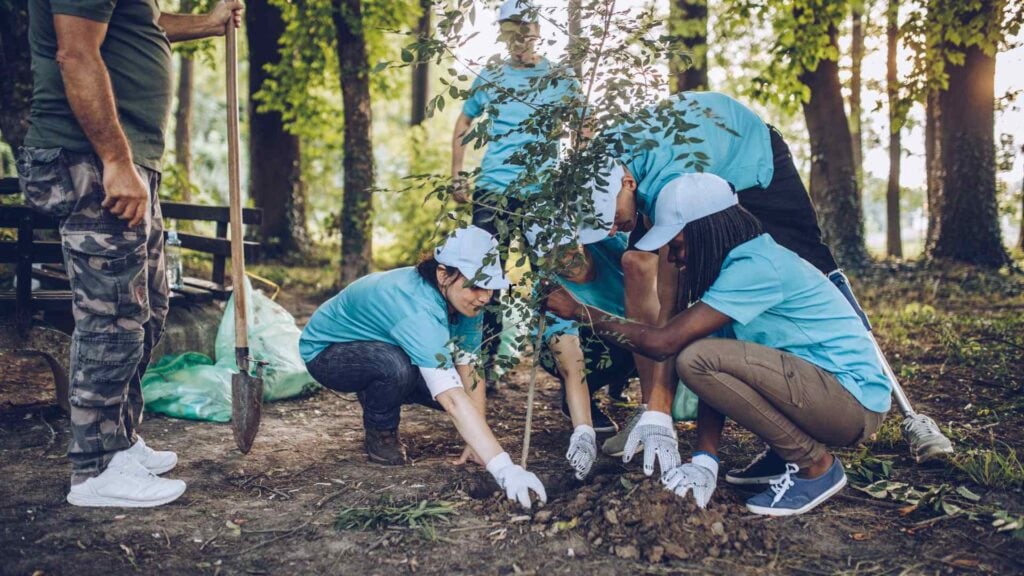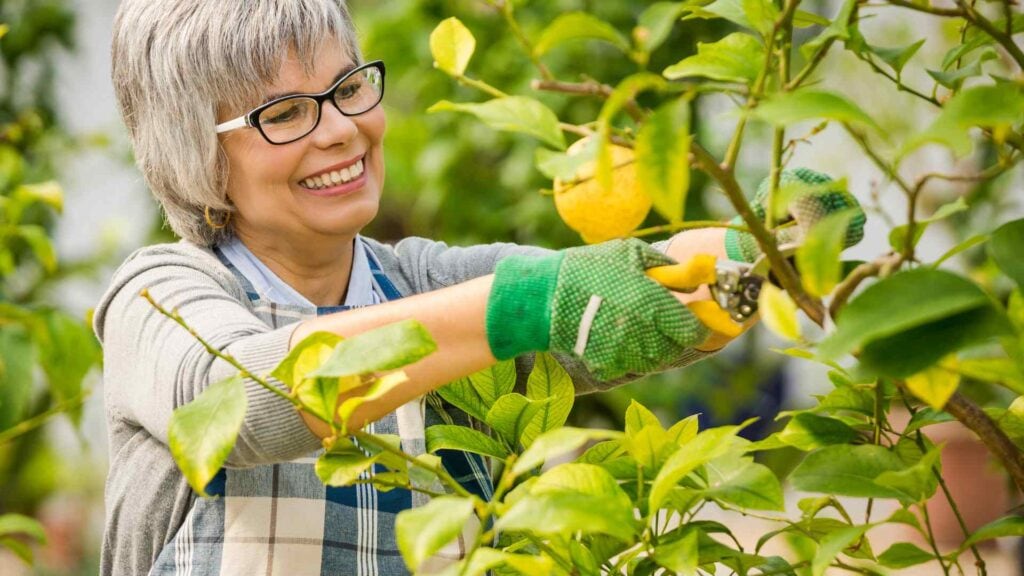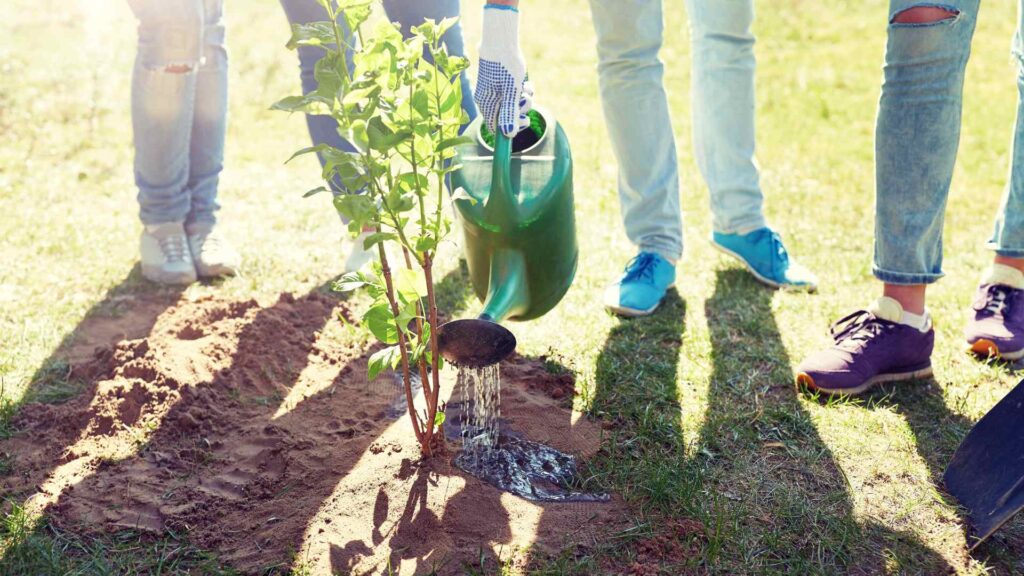We've spent our entire lives surrounded by trees. They provide the setting for a treasured memory and the sight of green we desire when we look out our windows, an activity we engage in frequently.
Trees may seem inert and unmoving, but they possess great qualities that can improve the quality of life for everyone. If a single tree possesses strength, imagine what a forest can do. Do trees have any special abilities?
Trees and Their Importance
Trees Aid The Fight Against Climate Change.
There are several ways in which trees can be considered miraculous. However, their capacity to soak carbon dioxide is one of their greatest strengths. They can store carbon for decades or millennia in their wood and roots after sucking it out of the air.
In its first year alone, a single tree can take in as much as 22 kg of carbon, and by the time it's 40 years old, it will have stored 1 tonne of carbon. One acre of trees may annually soak up as much carbon as is produced by driving a car 26,000 kilometres.
Trees Improve Both Our Physical And Psychological Well-Being.
A tree's health can reflect on our own. According to research, taking a stroll in a municipal park's tree canopy, for example, has been linked to lower levels of anxiety and despair.
The good news is that these calming effects of nature don't require a lengthy period spent there. You've probably experienced some positive effects from a stroll or hike in your local area. For good reason, we gravitate towards parks and other natural areas.
Access to green space in the neighbourhood also improves our physical health by motivating us to get up and walk about. Nature can aid in the fight against obesity since people tend to be more active in green spaces like parks and neighbourhoods with plenty of trees.
We Can Breathe Easier Because Trees Filter The Air We're Exposed To.
Let the leaves handle it. Trees filter out the fine particulate matter that most damage human respiratory systems from our air. Fossil fuel combustion produces this type of pollution, which can accumulate unhealthy in urban cores and on the outskirts of industrial zones.
Most filtration done by tree leaves occurs within 100 feet of a tree. Thus, trees should be planted near where people will use them to protect themselves from harmful air pollution. Asthma and cardiovascular disease account for 5 per cent of all deaths, which might be prevented with more trees in cities, especially in low-income areas near roads and industry.

Wildlife That We Cherish Can Thrive Because Of Trees.
Many of us can observe the joy that our feathery and furry neighbours take in their "high-rise apartments" from the comfort of our own homes. A single tree can serve as a lifeline for various creatures.
Even more, a forest that has not been logged can provide shelter for some of the most robust webs of life on Earth. Our most pressing conservation need is for old-growth forests, which provide habitat from the forest floor to the treetops. Many species can flourish in this location due to the variety of available habitats.
Trees Are A Great Way To Reduce Heat And May Even Save Your Life.
We may all benefit from the shade that trees provide. Because of global warming, temperatures are rising, and heat waves are lasting longer. The heat is only sometimes felt everywhere. Areas with much paving tend to get hotter than their surroundings by as much as five to eight degrees. The increased heat in these places well into the night is likewise hazardous to our health.
Here come our neighbouring trees and shrubs with twigs and leaves. The shade trees provide is similar to that of an artificial air conditioner, and it can help reduce the strain on our increasingly overworked AC systems.
Trees Act As Natural Filters, Improving The Quality And Consistency Of Your Drinking Water.
Toast a tree in your neighbourhood! Your water has made quite the voyage to your faucet, so raise a glass to distant trees. Trees are responsible for storing and purifying more than half of the water in the United States.
To do this, forests filter rainwater, removing harmful substances like sediments and chemicals before releasing them gradually back into streams and aquifers. Because trees filter out contaminants, this water needs less work and costs less to purify before it reaches your tap. We have a more consistent water supply because the rainwater wasn't diverted directly into a river but instead percolated via these natural filters.
Trees Act As A Natural Flood Barrier.
Like all other forms of life, trees require water for survival, and they can consume much of it. One day is all it takes for a big tree to drink 100 gallons. Because of this, they reduce the risk of flooding in low-lying places like river plains when it rains heavily.
Trees can mitigate the dangers of flash floods and erosion by making the ground more permeable to water and preventing dirt from washing away, thanks to the anchoring effect of their roots. And that's great news, especially in light of increasing severe weather and the potential for floods.
Power Bills Can Be Reduced By Planting Trees.
And lastly, you did read that correctly. Trees can help you save money on your monthly energy expenses.
If you plant them properly, that's because they'll provide shade during the summer, negating the need for air conditioning or even fans. The best results will be achieved if trees are placed on the east and west sides of the house.
Winter windbreaks from trees keep homes warmer and more comfortable. Planting evergreen trees on the north side of your house and plants around the foundation will mitigate the chilling impacts of winter winds.
It has been calculated that planting trees and bushes can reduce energy costs by up to 25 per cent. You've arrived at yet another natural wonder.
Trees Enhance The Quality Of Life.
It's not unexpected that trees improve people's quality of life, given all the ways they can help. In and of themselves, the world's natural wonders improve the quality of life here.
A mature tree may offer distinct benefits than a newly planted tree. In conclusion, we can all reap the most rewards if we immediately initiate widespread tree-planting efforts.
One of the most surefire ways to make a location more sustainable is to plant trees. It's for the people, not the location.
Trees are vital for more reasons than just their aesthetic value. Environmentally, trees are vital. And we couldn't make it without them, either. Trees are vital to the well-being of humans, animals, and other plant life. Thus, we should do what we can to halt forest destruction.
Instead of receiving, we should give back by planting more trees. The ecosystem can be restored, and lost woodlands can be revived through this action.
Trees and Their Scientific Value

Physical And Emotional Happiness
Urban woods' ability to trap and remove pollutants from the air is a major boon to human health. PM, carbon monoxide, ozone, nitrogen dioxide, polycyclic aromatic hydrocarbons, sulphur dioxide, and other air pollutants have been linked to bronchitis, glaucoma, heart attacks, autonomic and autism disorders, microvascular function, hypertension, and impaired cognitive development in children.
Education And Brain Research
To improve the quality of the air we breathe, tree planting is essential. Urban trees in the 48 contiguous states are projected to remove 711,000 metric tonnes of pollution every year. Research has found that 35 different types of woody plants all gather PM.
Resources And Economy
Trees are beneficial to urban environments because they remove pollution and reduce energy use while also boosting property prices, growing the economy, and attracting tourists. A yearly worth of $18.3 billion is attributed to trees because of the pollutants they filter out of the air, the energy they save, the carbon they store, and the pollution they prevent.
Because trees provide several benefits and ecosystem services, investing in their care and upkeep can be a wise use of financial resources. This kind of ROI can quickly multiply initial investment amounts.
This rate of return needs to account for many advantages properly. Trees provide shade, slow the deterioration of roads and pavements, encourage customers to visit a business district, and raise the value of nearby real estate.
Quality landscaping with well-maintained trees can raise rental prices for an office building, so long as the trees do not obstruct the view from the street. The appropriate tree placement might lower your energy expenditures.
Adaptation And Reduction Of Climate Change Impacts
Because of climate change, human habitation patterns are shifting. Rising temperatures seriously threaten human health since they can lead to a rise in heat-related mortality, ailments, and infectious diseases.
Trees in urban areas can help reduce temperatures if they are positioned strategically. In addition to shade, trees cool cities through evapotranspiration.
A global study of 94 cities found that trees can reduce temperatures by an average of 1.9 degrees Celsius (plus or minus 2.3 degrees) during the day.
Adding trees to a city's infrastructure can cut temperatures by 9 degrees Celsius. This cooling of large cities can lessen climate change's health risks.
Clean Energy Technology
Trees can serve as crucial components of "decentralised green infrastructure" for water regulation in urban environments. Water runoff is a major problem in urban areas since it can heighten people's exposure to pollution and lead to costly property damage.
The quantity and quality of stormwater flow can be greatly improved by planting trees. After interacting less with impervious surfaces, stormwater entering local rivers and water-related ecosystems is cooler and has fewer pollutants.
Phytoremediation, in which trees are used to clean up polluted areas, is another area in which trees prove useful. Unlike grey infrastructure, the value of mature trees increases over time. As a result, it may be financially prudent to plant trees.
A Guide to Tree-Planting
Although planting a tree can be a gratifying and eco-friendly activity, it requires more than just preparing a hole and dropping in a seedling. There are crucial procedures to follow to make sure your tree thrives, and the environment is protected.
Time Is Of The Essence.
It would help to plant your tree between October and March for the best results. It's less of a shock to the system to uproot a tree in the winter, when it's dormant, rather than in the summer when it's wide awake and able to resist being uprooted.
Identify Appropriate Species
Choosing a tree for its aesthetic qualities is only one aspect of tree planting. Doing a thorough site survey is crucial, considering factors like soil quality, wildlife diversity, light, and neighbouring tree types. When in doubt, have a professional survey your property.
Obtain The Necessary Approvals
Always acquire the landowner's permission before planting a tree on private property. If your house will impede your neighbours' view or encroach on their property, you should talk to them even if you own the land. Realising the advantages is just as crucial as actually doing anything about them. Have some fun in the tree!
Conclusion
It is very important to plant trees because they have special qualities that can make everyone's life better. Trees help stop climate change by taking in carbon dioxide. Their wood and roots can store this gas for decades or even thousands of years. They also make you feel better physically and mentally by lowering your stress and hopelessness. People who live near green areas are more likely to get up and walk around, which helps fight obesity.
Trees clean the air, which lowers the risk of asthma and heart disease and gives many species a place to live. They are also natural filters that remove dangerous substances from rainwater, making drinking water better and more consistent. Trees also naturally block floods, making low-lying places like river plains less likely to flood when it rains a lot.
Planting trees can also lower your power bills because they provide shade in the summer, so you don't have to use as much air conditioning or fans. In the winter, trees that block the wind keep homes warmer and cosier. Winter winds can be less chilling if there are evergreen trees on the north side of a house and plants around the base.
Growing trees is important for keeping the environment healthy because they keep it cool, improve the quality of drinking water, prevent flooding naturally, and lower energy costs. We can all enjoy the benefits of nature and help make the future healthy by including trees in our daily lives.
People's standard of life is greatly improved by trees because they provide many benefits. They are very important for the business, people's health, and the environment. Pollutants in the air can cause health problems like bronchitis, glaucoma, heart attacks, and problems with brain development. Trees in cities can trap and clear these pollutants. By cutting down on pollution and raising property values, trees also help with education and brain study. In addition to helping the business, they cut down on energy use, store carbon, and stop pollution.
Taking care of and maintaining trees can be a good use of money because they provide shade, slow down road damage, and raise the value of real estate. Trees can also help lessen the effects of climate change by blocking the sun and cooling towns through a process called evapotranspiration. They can also be used as part of "decentralised green infrastructure" to control water use in cities.
Planning ahead is very important when planting a tree. For the best effects, planting should happen between October and March. Picking the right species and doing a full study of the area are important parts of planting trees. It is also important to get permission from the owners, since a house that blocks a neighbor's view or goes onto their land can be harmful.
Trees are important for people, animals, and plants to live. Planting more trees can help ecosystems recover and bring back lost forests.
Content Summary
- Trees play a pivotal role in combatting climate change by absorbing carbon dioxide.
- A single tree can store up to a tonne of carbon in 40 years.
- An acre of trees can offset carbon equivalent to driving 26,000 kilometres annually.
- Trees contribute significantly to our mental and physical well-being.
- Walking amidst trees has been linked to reduced anxiety and depression levels.
- Green spaces encourage more physical activity, aiding obesity prevention.
- Trees serve as natural air purifiers, removing harmful particulates.
- Urban areas benefit from trees, reducing respiratory and cardiovascular diseases.
- Wildlife thrives thanks to the habitats trees provide.
- Old-growth forests are essential conservation zones with diverse habitats.
- Shade from trees can counteract heatwaves, making urban areas cooler.
- Tree shade is a natural alternative to air conditioning.
- Trees significantly improve the quality of drinking water.
- Forests naturally filter rainwater, removing harmful chemicals.
- Trees act as flood barriers, absorbing excess water during heavy rains.
- Strategic tree planting can cut household energy costs by 25%.
- The mere presence of trees elevates the quality of life.
- Trees are not just for beauty; they're environmental necessities.
- Stopping deforestation and promoting tree planting is crucial.
- Trees have scientific value, promoting physical and emotional health.
- Urban trees remove pollutants, reducing numerous health risks.
- Tree planting aids in ensuring cleaner air in urban regions.
- Trees contribute a yearly worth of $18.3 billion through ecosystem services.
- Well-maintained trees can increase rental prices of properties.
- Trees help adapt to and mitigate the impacts of climate change.
- Strategic tree placement in cities can reduce temperatures.
- Trees play a role in clean energy technology by managing water in urban areas.
- Trees serve in phytoremediation, cleaning up polluted zones.
- The value of mature trees increases, making them financially sensible.
- Tree planting isn't just digging; it's about ensuring the tree's and environment's well-being.
- The best time to plant trees is between October and March.
- Choosing the right tree species for a location is essential.
- Securing permissions is crucial before planting, especially in urban areas.
- Trees are more than aesthetic; they're vital for sustainability.
- Trees boost property values and attract tourism.
- Research indicates that trees in urban areas can reduce pollution significantly.
- Trees also serve as natural windbreaks during winter.
- They make urban environments more pleasant and sustainable.
- Trees can lower temperatures by an average of 1.9 degrees Celsius in cities.
- Trees enhance stormwater flow quality, reducing urban runoff pollution.
- A professional site survey can aid in selecting the right tree species.
- Trees help in managing extreme weather events, such as floods.
- The health benefits of trees range from reducing stress to preventing diseases.
- Conservation of old-growth forests can support a wide array of biodiversity.
- A well-planned green infrastructure with trees can save energy costs.
- Trees are an investment that provides returns in multiple environmental benefits.
- They play a significant role in the local and global ecological balance.
- As climate patterns shift, trees in urban areas offer much-needed respite.
- Engaging in tree-planting can be a fulfilling activity with long-term gains.
- Trees are essential for the well-being of humans, animals, and other plants.
FAQs About Trees
Trees offer mental and physical health benefits, including stress reduction, increased physical activity, and improved overall well-being.
Trees can increase property values, save energy costs by providing shade, and create jobs in forestry and landscaping.
Tree roots help bind the soil, preventing erosion and enhancing soil fertility, which is essential for sustainable agriculture.
Successful tree planting requires selecting the right tree for your region, planting at the appropriate depth, and providing proper care during establishment.
Individuals can plant trees in their yards, participate in community tree-planting initiatives, or support organisations dedicated to reforestation and conservation efforts.

